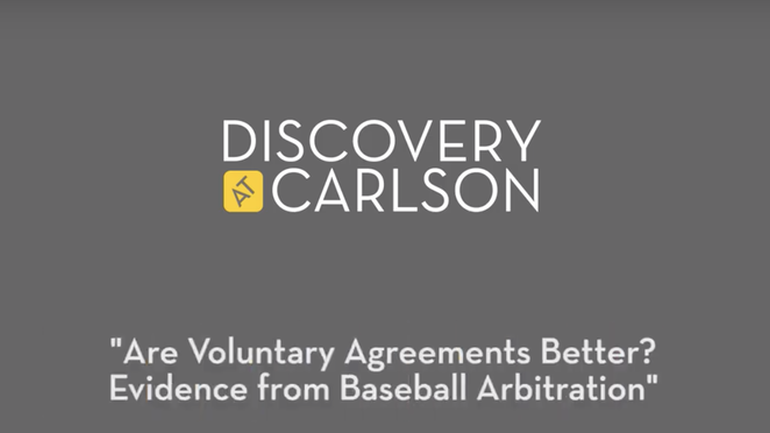
Dispute Lessons from the Major Leagues
Monday, February 26, 2018
What can Major League Baseball teach the business world about dispute resolution? According to Professor John Budd, quite a bit more than you might think. And as he has discovered, those lessons can defy the conventional logic that surrounds conflict.
The dominant narrative on resolution boils down to this: It’s better for individuals to settle disagreements among themselves, rather than accepting a decision imposed by, say, a boss or a judge. It certainly seems logical. The parties get a stronger sense of ownership and a greater ability to modify the agreement to their liking—something that in theory at least, leads to better long-term outcomes.
“It does seem to make sense that you’d respond well to an agreement you’ve shaped yourself,” says Budd
John Budd: Dispute Resolution Lessons from the Major Leagues
Carlson School of Management Professor John Budd discusses his research entitled, "Are Voluntary Agreements Better? Evidence from Baseball Arbitration," for the Discovery at Carlson series.
That’s where baseball came into the picture. To test that logic, Budd and Associate Professor Aaron Sojourner explored Major League Baseball’s contract arbitration process, looking at 1,400 contracts over 24 years. “Baseball was a perfect example,” he says. “Players with between three and six years of seniority can go to arbitration if they don’t reach a salary agreement with their club. Every year, some choose arbitration, while others settle voluntarily.
“If voluntary agreements were truly better,” he adds, “you’d expect to see superior on-field performance by players who came to such agreements, along with longer-lasting player-club relationships.”
Did the conventional wisdom hold up? Sort of. Budd found that relationships were more durable when players and clubs negotiated a salary rather than having one imposed by a third party. But arbitration also didn’t seem to affect player performance. One possible reason why: Salary frustrations aside, players know they’re being watched—and that playing well is the best way to land a bigger contract.
As Budd explains, there are clear takeaways for business. “Organizations might want to rethink dispute resolution,” he says. “In particular, they should be concerned with how disputes are resolved when performance is harder for others to observe. When that happens, employees don’t have the same incentives to put bad feelings aside. One result is that problems might fester.”
Conflict resolution methods matter. Different forms of dispute resolution could have different effects on employees in terms of their performance, in terms of how long they stay with the organization, and maybe other dimensions that we haven't looked at.
